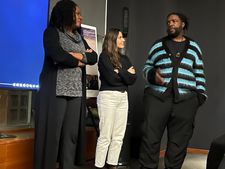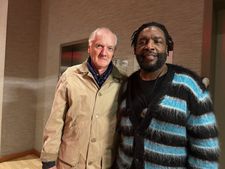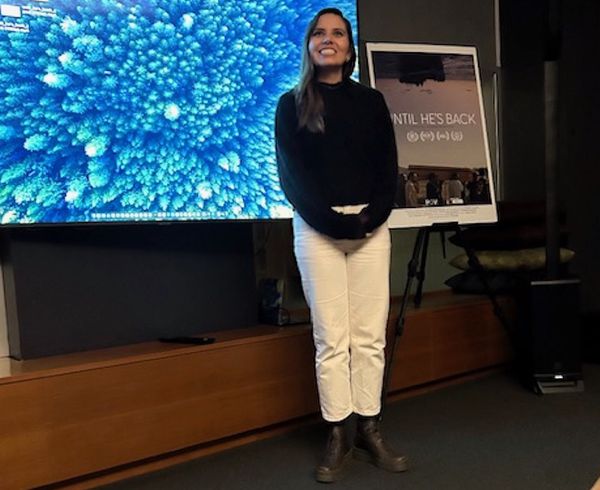Last night, music producer and 99 Records founder Ed Bahlman and I attended a screening of Jacqueline Baylon’s award-winning short, the Oscar contender Until He’s Back, hosted by Questlove (Oscar-winner for Summer Of Soul (...Or, When The Revolution Could Not Be Televised)). The evening was introduced by Erika Dilday, executive producer of the PBS series POV and executive director of American Documentary Inc. (AmDoc) in a building designed by Frank Gehry, not far from New York’s City Hall in Lower Manhattan.
 |
| Erika Dilday with Jacqueline Baylon and the host Questlove Photo: Anne Katrin Titze |
Until He’s Back (a highlight of the 15th edition of DOC NYC), shot by a team of cinematographers (Carmen Molina, Pedro Ballesteros, Guillem Trius) over a two-year span (and edited by Hailey Gavin) transports us into the family heartbreak of the loss of a son, who, looking to find a better life than the one he had in Morocco, embarked on the dangerous crossing of the Strait of Gibraltar to the coast of Spain.
Taking cues from Gianfranco Rosi’s (Berlinale Golden Bear winner and Oscar-nominated) Fire At Sea, an early film addressing Europe’s migrant crisis, Baylon braids the different strands that have to come together in order to return the remains of his son, Yahya, to grieving father Ahmed Tchiche in Morocco. An NGO worker, a mortician in Spain and a car salesman who volunteers all work together to achieve this seemingly impossible task, held up by Spanish bureaucracy.
The tragic fates of many desperate migrants taking enormous risks to cross the Mediterranean, crammed in unsuitable boats in a rough sea tend to be widely ignored in the media. They are represented, if at all, as anonymous numbers, not as individual histories. Until He’s Back restores a dignity, and similarly to Matteo Garrone’s (winner of Best European Film at the San Sebastián International Film Festival and Oscar-nominated) Io Capitano, albeit in documentary form, conjures up universal questions of family and mourning, traditions and risk taking on the road ahead.
 |
| Questlove with Ed Bahlman Photo: Anne Katrin Titze |
Shots of the sea at times summon feelings of longing, at others peril. A marvelous sequence of Ahmed walking hand-in-hand with his little granddaughter Maysa to go shopping at the market in Morocco turns the specific into the all-embracing. The New York New York ringtone of an overworked immigration agent echoes musically across the Atlantic, and the strict rules of who is allowed to go to the cemetery and who isn’t gives stark insight into heritage and customs.
Erica Dilday introducing the evening: I’m an executive producer at POV and happy to be here and now want to give the stage to the man of the hour, Ahmir Questlove Thompson.
Questlove: I felt really compelled to support my comrade here. I’ve known her for a long time. Both she and I started out at 30 Rock together. What I call 30 Rock University. It’s a powerful film and it’s just the beginning of the journey. Congratulations for your grand jury prizes for the Big Sky Festival and also the Hampton’s [International] Film Festival. I’m really proud to support this film.
Jacqueline Baylon: Thank you both of you for being here. Amir and I have known each other for a long time and thank you all for being here. It’s a film that I worked on for about two years and there’s a lot of heart in it and I worked with amazing filmmakers.
 |
| Jacqueline Baylon on Guillem Trius: “Guillem, he’s amazing. I got very lucky to meet him. He had been filming with Open Arms many times,” |
After the screening, Jacqueline returned for a Q&A:
Ed Bahlman: Can you talk about your team of cinematographers?
JB: Yes, I’d love to. I worked with three rotating cinematographers out of Barcelona, Guillem, Pedro and Carmen, mostly because we didn’t know when the body was going to be returned. Also Martin would randomly call me and say that there was news. So basically it depended on who was around. And then we used many cameras, just because of budget. But most of the stuff in Morocco was shot with an FX3 because I didn’t ever get official permission from the government to film. I waited almost six months, maybe five months to get permission and I was never granted. So we wound up sneaking into the country as tourists to film.
EB: Who was the cinematographer on the ocean?
JB: Guillem, he’s amazing. I got very lucky to meet him. He had been filming with Open Arms many times, so he already knew. He also had the connection with Open Arms.
EB: Great work!
 |
| Questlove with Ed Bahlman discussing 99 Records and Liquid Liquid Photo: Anne Katrin Titze |
JB: There were always three of us the whole time [a cinematographer, an interpreter, and herself].
Anne-Katrin Titze: You begin the film with hands. There are a lot of close-ups of hands. Can you talk about that choice?
JB: Yes, I just didn’t want to be in people’s faces really as much. I just felt like you already see Ahmed so desperate, right? So just seeing how his hands sort of showed that desperation I thought was really important. Maybe I was reading into it too much, but sometimes he would move them a little bit more. When he was calm he wouldn’t move them as much. So that to me represented what and how he was feeling.






















